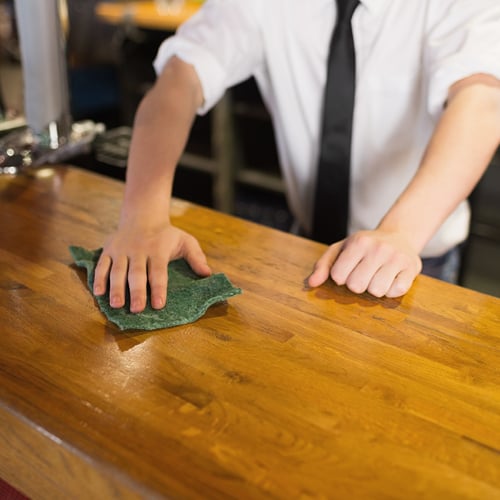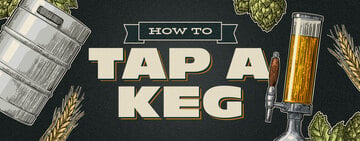
Becoming a bartender requires strategically placing yourself in a position where you can observe, learn from, and support an experienced bartender. By seeking entry-level positions at bars and restaurants, you can create an environment that allows you to acquire knowledge while earning a paycheck. While attending bartending school and utilizing other educational resources can be helpful, gaining firsthand experience in the service industry is the most effective way to gain proximity to the bar and develop a solid foundation of knowledge. Use our guide as a resource to discover how to embark on a journey towards becoming a bartender, even without prior experience.
1. Get a Bartending License
While a bartending license is not a requirement in all states, having one provides the leverage you need to get hired in a competitive field. Online bartending certification is easy to find with a quick internet search, but make sure the course is state-approved. To pass the course, you must demonstrate an understanding of state laws. Additionally, a bartending license does not guarantee employment. You still need to earn the position by being the best candidate.
To receive a license, you must meet the minimum age for serving alcohol, which differs from state to state. In addition to meeting state or local requirements, a bartender license course will ensure that you're familiar with the following topics:
- Knowledge of laws and penalties regarding minors
- Identifying the stages of intoxication in customers
- How to handle and prevent disturbances
2. Get Hired as a Barback

The most common advice from actual bartenders is that you should start as a barback if you want to learn how to be a bartender. The barback position requires no experience, only a willingness to work hard. Barbacks do most of the manual work behind the bar, like cleaning, restocking, and a lot of heavy lifting. They essentially act as the bartender’s assistant, which puts them in a great position to learn and observe.
Working as a barback is far from easy, but it provides many benefits. For someone who has never worked in the bar or foodservice industries, the role provides an understanding of how everyday operations work. By paying attention to the bar's activities and atmosphere, you gain knowledge to help your bartending journey.
- As you stock beer and liquor for the bar, make a point to learn the different brand names
- Watch the bartender as they make cocktails and make note of the most popular drinks
- Get comfortable working behind the bar and helping with customer requests
- Memorize bartending terms like "straight up" and "on the rocks"
- Learn when to prepare for the busy rushes and stock up accordingly
- Become familiar with the different types of barware and garnishes
- Provide support for your bartenders and show an eagerness to learn from them
3. Start at a Restaurant Bar
In addition to working as a barback, you can start as a hostess or server in a restaurant with a bar and work your way up. Restaurants that sell alcohol have frequent openings for bartenders, and they often promote from within. Another benefit of getting your feet wet at a restaurant bar is that restaurant chains usually have stringent training programs that teach you to mix drinks to their standard.
Bars in restaurant chains are often smaller than and not as busy as the bars in lounges, nightclubs, or taprooms. They provide a gentler environment in which you can practice your skills and get experience under your belt. The hours are also different, as many restaurant bars don't operate as late as other bars. There are fewer opportunities to experiment with cocktails, but a restaurant chain might be the stepping stone you need before branching out to a trendier locale.
4. Find a Bartending Mentor

As you seek employment in restaurants and bars, look for a bartender willing to take you under their wing. Be sure to display the following qualities and behaviors when you start:
- Always treat your bartenders with respect
- Anticipate their needs and keep the bar stocked at all times
- Ask plenty of questions, but avoid doing so during busy hours
- Wait for the calm moments to strike up a conversation
- Look for the bartender who is willing to share their knowledge
As a server, the more time you spend around the bar, the more likely you are to find a mentor. Follow these tips:
- Offer help to your bartenders whenever possible
- Retrieve any items they need from the kitchen or storage
- Run food orders out to customers at the bar
- Keep the bar top clear by delivering any drinks that have been prepared for the servers
- Always make sure to tip your bartenders fairly and generously for any drinks they make for you
5. Learn How to Pour Drinks

Anyone can pour rum and cola into a glass and call it a cocktail. If you want to become a good bartender, learn how to pour liquor correctly so you achieve a balance between the spirits and the mixers. Invest in some bartending tools and start practicing your pours at home.
If you have experience working alongside bartenders, you are familiar with the jigger. Jiggers are small cocktail measuring tools that allow you to control the amount of liquor you pour. With practice, you may be able to skip using a jigger and free pour instead, which is the art of pouring liquor using a silent count.
With either pouring method, accurate pours are essential for a few reasons:
- The right amount of alcohol yields a balanced drink that tastes great
- Every time you over pour, you cost the bar money
- Good pouring technique makes you more efficient at mixing drinks
6. Practice Mixology
Once you master the art of pouring, try experimenting by making your own cocktails. You can start by practicing with standard well drink recipes like gin and tonics or screwdrivers and work up to more complicated cocktails with multiple mixers. Learn about cocktail ingredients like bitters and syrups and how they change the taste of your drinks.
Not every bartender has to be a mixologist, but it does help to have an understanding of how to build cocktails. Through this process, you might find that your interests are more geared towards the craft of mixing drinks, rather than serving customers.
7. Be Patient and Available
Good bartending skills take time to develop. It takes many hours and shifts working at your barback position and learning the trade to gain the trust of the bartender and bar manager. By displaying a clear willingness to help, opportunities will come your way. Before you know it, the bartender might feel comfortable stepping outside for a break and asking you to take over in their stead. The more useful you can make yourself, the better.
8. Don’t Rely on Bartending School Alone
Bartending school might seem like a quick path to achieving your goal, but you still need real-world experience before a bar manager will take a chance on you. You can learn many things in bartending school, like how to pour and practice mixology, but you can't learn how to handle a tough crowd of thirsty customers.
Working behind the bar requires the ability to multitask and perform well under pressure. In bartending school, you might learn how to make the perfect martini, but real-world experience teaches you how to make several different drinks simultaneously, tend to your customers, and keep your bar area clean with a smile.
Bartender FAQ

Check out these bartending FAQs to learn if you're a good fit for this position.
What Is the Average Bartender Salary?
The average salary for a bartender is $16.14 per hour in the United States but could range between $8.29 to $31.40 per hour depending on location and experience. However, bartender salaries rely heavily on tips, meaning the starting salary is significantly lower than their salary. Tips account for an average of $150 of additional income per day.
What Are the Typical Hours for a Bartender?
Bartenders work in shifts, much like the rest of the foodservice industry. The day shift works from around 9 AM to between 4 and 6 PM. Then, night bartenders take over and work until sometime between 10 PM and 2 AM. If you bartend at a club or similar establishment, you might work as late as 4 AM.
What Age Can You Be a Bartender?
The legal age to work as a bartender varies by state, but the youngest age to be a bartender is 18. Some states don't allow bartenders younger than 21. Additionally, some states require new bartenders to take an alcohol awareness training course before they can begin working.
What Are Some Important Bartending Skills?
Other than knowing how to perform your duties, several soft skills are crucial to your success as a bartender. Good social skills might be the difference between a generous tip and no tip at all, and many bartenders need some level of showmanship. A strong memory will serve you well as customers call out their drink orders, and physical stamina will keep you going strong after hours on your feet. Experienced bartenders will also highlight the importance of multitasking and communication, especially during peak hours.
Becoming a bartender is challenging for someone without experience, but not impossible. When you first start, maintain an attitude of humility and a willingness to learn. Beginning as a barback and learning from a mentor are two things you can do that require no experience. With perseverance and diligence, your path to becoming a bartender is wide open.





